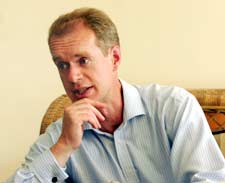He also speaks about how the imperatives of global trade and global demography means that however much the West wishes that it could still be guaranteed of economic predominance, it cannot be. Part I of the interview: 'India is buzzing' Focussing on India and China, the BBC will telecast a special series Emerging Giants from May 22 to May 28, 2006. What are your thoughts on the strengths and weaknesses of India vis a vis China? My impressions of India are that you have a population full of vitality, a young population.
What strikes me as a European is the degree to which youth dominate this country. It is utterly different from the feeling you get in Germany or France or the UK which are mature societies but we have a huge problem which is a demographic problem. You have your own demographic problem which is different from ours but it gives your culture and economy a sense of vitality which is very attractive. The other wonderful thing about India is the degree to which democracy works in a country which is so big and so diverse. It is complicated, you have corruption and ridiculous bureaucracy but in the end people do believe that voting counts for something. I have been in slums all over the world. In most slums in developing countries, people feel completely disenfranchised, maybe they have a vote but it is a very theoretical vote, they don't think it counts.
In India, there is a sense that even slum dwellers have a stake in society. They have a voice and they can throw out governments or they can do their best to throw out governments if they feel they have been completely ignored. That is something to be proud of. Do you think internationally other nation-States have started accepting India as a big power?
I do. Look at Tony Blair, George Bush and other international leaders -- they now take India seriously. Look at the nuclear deal which basically breaks many of rules that the Americans have set for non-proliferation but they did it. They (the US) trust India increasingly as a staunch ally. There is no question that India now matters on the global stage. Some Asian thinkers feel because economic power is shifting to Asia, the West is finding it hard to accept this shift and that's why we see the Dubai Ports issue and opposition to Laxmi Mittal's Arcelor bid? Change is never easy. In the end though the imperatives of global trade and global demography mean that however much we might wish in the West that we still could be guaranteed of economic predominance, we cannot be. We can see quite clearly how the trends work, we can see it unfolding. So even if we worry about losing our pre-eminence and worry about Indian and Chinese companies encroaching on our turf, we are still going to do business.
We are still, in the end, going to embrace this new global economy because we have no choice. We can't cut ourselves off from this vast market India and China represent. It never works in a straight line, yes, India is growing massively and will continue to do so but one should be wary of over-hyping it. It is not going to be easy for India to turn itself into a truly modern 21st century economy. You can use the rhetoric and the slogans but it will actually take a long time. In a way maybe we are all guilty of adopting a new slogan that the next century belongs to India and China. To a certain extent it is right but the next century will also be dominated by the United States just as the last one was. Because the US is not going away and its economic power is tremendous. It is never black and white, that it is America's century or Asian century. It is more complicated than that. Is there over-hype, is there a sense of cockiness that Indians have about this new improved position? I don't think most Indians are (cocky)because most Indians are better aware of their problems. I think the media maybe sometimes plays up this image of this amazing success and India taking on the world. But Indians are very astute people, they know that it is not a straight line graph going up to heaven. It is going to take a long time and is going to bring with it huge contradictions and problems like this reservations issue. You can't have progress without challenges that you haven't had to face in the past. There is still mutual suspicion between India and China. Why do you think both countries find it so hard to trust each other? I am going to ask Mr (Rahul) Bajaj about the prospects of a free trade deal between India and China which some Indian politicians think is inevitable. I think he has concerns about it. He thinks India is not ready or that it would necessarily be in India's interest. I don't think and China can be trusting allies soon. There is too much historical baggage and geographical rivalry. But the relationship is quite stable I don't think it will veer off into hostility. I see a status quo. There are massive mutual interests and this issue of free trade is perhaps at the centre of it all.
There is a potential there for a market, access to a market of over 2 billion people for businessmen in both countries if they can only do the deal. At some point maybe they will do a deal. It may take some time. Photograph: Jewella C Miranda In the second part of an interview with Archana Masih, the BBC's HARDtalk presenter Stephen Sackur discusses India's extraordinary democracy and its challenges.
In the second part of an interview with Archana Masih, the BBC's HARDtalk presenter Stephen Sackur discusses India's extraordinary democracy and its challenges.






